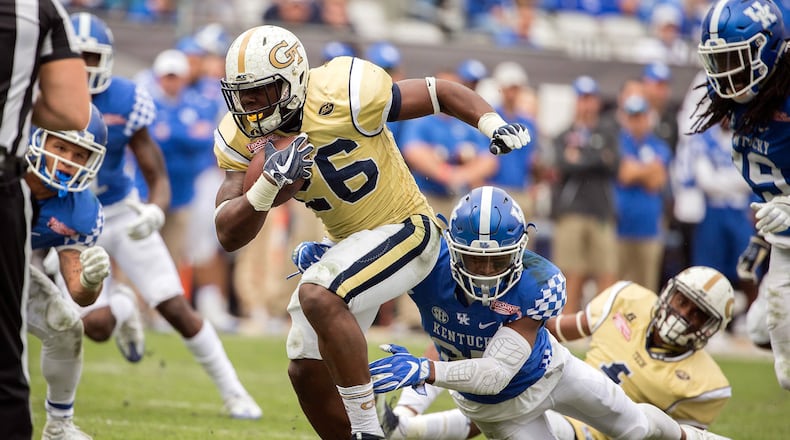Dedrick Mills was determined not to let his second chance go to waste.
After a promising freshman season at Georgia Tech in 2016, Mills, who was named the TaxSlayer Bowl MVP that season with 169 yards and a touchdown in a win over Kentucky, was dismissed from the program before the 2017 opener after a third drug test came back positive for marijuana.
With frequent drug testing at Tech, Mills couldn’t hide his marijuana use. As a result, he found himself in a position to find a new place to play.
After two seasons at Garden City Community College in Kansas -- the first of which was slowed by injury before a breakout second season that saw him run for 1,358 yards and 19 touchdowns -- Nebraska offered him a scholarship. Mills accepted, this time dedicating himself to realizing his dream of the NFL.
Along the way, Mills, a Waycross native, became aware he needed help to overcome the depression and anxiety he readily experienced, which is what led to his previous substance abuse. Upon arrival at Nebraska, he was recommended to see Brett Haskell, a sports psychologist at the university. It was then that Mills knew he needed to make his mental health a priority.
“You always got that good support group as far as my coaches, teammates, other staff around the school and other people in the community,” Mills said. “And Dr. Haskell, she was the No. 1 person I went to if I was going through anything. It didn’t matter what it was, I could pick up the phone and call. That helped shape me into where I am today and who I want to be.”
In an essay he wrote in September for “Nebraska Today,” an in-house publication at the university, Mills detailed his past with substance abuse and depression. Now an advocate for mental-health awareness, Mills wrote that when his professional football days are over he would like to become a sports psychologist so that he can “help others the same way Dr. Haskell and the University of Nebraska helped me.”
When it came to football, Mills had to learn a new offense at the FBS level.
At Tech, under former coach Paul Johnson, Mills was a B-back in the triple option. At Nebraska, the offense was vastly different and took some time to get used to. But he had a few memorable games for the Cornhuskers. In 2019, Mills bulldozed his way through Wisconsin for 188 yards and a touchdown in a loss. Mills concluded his collegiate career in the 2020 season with 191 rushing yards on 25 carries in a win over Rutgers.
In total, Mills ran for 1,141 yards and 13 touchdowns with the Cornhuskers. Turning 24 this year, Mills decided to pass on what would have been a sixth season of college to pursue the NFL. He credited the experience at Nebraska for putting him on a path to make this a reality after how things transpired at Tech.
“I’ve learned and grown a lot,” Mills said. “That’s with life, school, football. All that comes together. I’ve learned a lot over the years, becoming a better man each and every day, knowing what to expect in life by listening and learning from others and learning from my own mistakes that I’ve made before.”
Over the past three months, Mills has been preparing for Tuesday’s Pro Day at Nebraska. Mills, at 5-foot-11 and 220 pounds, said NFL personnel are aware of how strong he is, how well he can block and how physical he plays. The message Mills has received is that teams want to see if he can run fast.
Therefore, most of his focus during his Pro Day training, which took place in New Jersey, focused on the 40-yard dash. Over the past few months, Mills said he learned how to properly run the drill.
“There are so many different mechanics in the form of running that I never knew,” Mills said. “Kicking your leg all the way back, almost like butt kicks -- you’re not supposed to do that. It’s the wrong form of running. That’s what I used to do, that’s why I was so slow. But now I just learned in training, they showed ways of how to pick your knees up and keep a straight form instead of getting all out of whack and running side to side. People run side to side when they come out, don’t do that. The first swing when you come out of there is key to running the 40. I learned that. As I was there, I got better and better every day.”
Mills took the tools he learned and clocked an unofficial 4.58 seconds in the 40-yard dash Tuesday.
With his collegiate journey at its end, Mills said he was appreciative of just how much the Nebraska program helped him. Beyond Haskell’s influence and the Cornhuskers’ coaching staff, Mills said his teammates always had his back from Day 1.
“Everybody here, they treat you like family. You don’t get that at every school,” Mills said. “Everybody loves you here. Having a brotherhood with your teammates. Not everybody on every other team are brothers. We always find a way to come together and be one.”
About the Author
Keep Reading
The Latest
Featured
